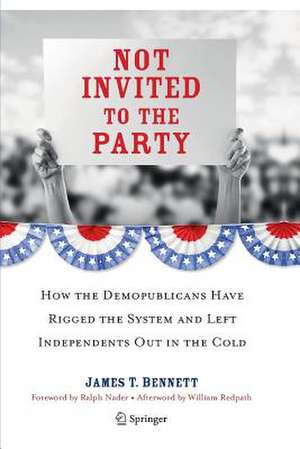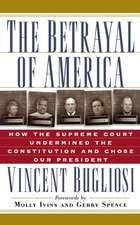Not Invited to the Party: How the Demopublicans Have Rigged the System and Left Independents Out in the Cold
Autor James T. Bennetten Limba Engleză Paperback – 25 noi 2014
Preț: 130.67 lei
Nou
Puncte Express: 196
Preț estimativ în valută:
25.01€ • 27.18$ • 21.02£
25.01€ • 27.18$ • 21.02£
Carte disponibilă
Livrare economică 31 martie-14 aprilie
Preluare comenzi: 021 569.72.76
Specificații
ISBN-13: 9781493900886
ISBN-10: 1493900889
Pagini: 224
Ilustrații: XII, 211 p.
Dimensiuni: 155 x 235 x 12 mm
Greutate: 0.32 kg
Ediția:2010
Editura: Springer
Colecția Copernicus
Locul publicării:New York, NY, United States
ISBN-10: 1493900889
Pagini: 224
Ilustrații: XII, 211 p.
Dimensiuni: 155 x 235 x 12 mm
Greutate: 0.32 kg
Ediția:2010
Editura: Springer
Colecția Copernicus
Locul publicării:New York, NY, United States
Public țintă
ResearchDescriere
Not Invited to the Party demonstrates how the dominant political parties--the Democrats and Republicans--have co-opted the system to their advantage. James Bennett examines the history and array of laws, regulations, subsidies and programs that benefit the two major parties and discourage even the possibility of a serious challenge to the Democrat-Republican duopoly. The American Founders, as it has been generally forgotten, distrusted political parties. Nowhere in the U.S. Constitution are parties mentioned, much less given legal protection or privilege. This provocative book traces how by the end of the Civil War the Republicans and Democrats had guaranteed their dominance and subsequently influenced a range of policies developed to protect the duopoly. For example, Bennett examines how the Federal Election Campaign Act of 1971 (as amended in 1974 and 1976), which was sold to the public as a nonpartisan act of good government reformism actually reinforced the dominance of the two parties. While focused primarily on the American experience, the book also considers the prevalence of two-party systems around the world (especially in emerging democracies) and the widespread contempt with which they are often viewed. Featuring incisive commentary on the 2008 election, and a foreword by third-party iconoclast, Ralph Nader, the book considers the potential of truly radical reform toward opening the field to vigorous, lively, contentious independent candidacies that might finally offer alienated voters a choice, not an echo.
Cuprins
The Issue.- The American Suspicion of Parties.- No Competition Allowed or He Who Controls the Ballot Controls the Election.- Then Along Came FECA.- FECA: The Demopublicans' Best Friend.- The State Feeds the Party and the Party Feeds the State.- 2008: The Year of Change – Or Plus Ca Change…?.- Taking the Party Outside: Do Other Democracies Treat Third Parties and Independents Any Better?.- Conclusion: Pulling the Plug?.
Recenzii
From the reviews:
“James T. Bennett analyzes the roots of political duopoly in this informative, although dense book. … Bennett starts with the notion that The Founders distrusted political parties. … This is very informative book, and you can feel Bennett’s passion about this issue. … I am still recommending this book to anyone who is interested in politics and the history of politics. … I am moving this up to four stars. I have learnt a lot from this book.” (Joanna, Goodreads, July, 2010)
“This brief but dense book … sets out to do what it is meant to do and does it extremely well, hence the four stars. Bennett gives a detailed look at why third parties have it so hard in the United State and how the two main parties, Democrats and Republicans, stack the field against any competition. … This book may have a narrow interest factor but those who read it will have plenty of information to digest.” (Marvin, Goodreads, July, 2010)
“3.5 stars. … some very powerful statements are in this book. For example, ‘Three hundred million people. Two choices. It doesn’t add up.’ It’s so true! I had no idea how many hoops these parties (other than R and D) have to jump through just to get their names on the ballot. … Recommend this book to everyone, ESPECIALLY before elections.” (Mandy McHenry, Goodreads, July, 2010)
“James T. Bennett analyzes the roots of political duopoly in this informative, although dense book. … Bennett starts with the notion that The Founders distrusted political parties. … This is very informative book, and you can feel Bennett’s passion about this issue. … I am still recommending this book to anyone who is interested in politics and the history of politics. … I am moving this up to four stars. I have learnt a lot from this book.” (Joanna, Goodreads, July, 2010)
“This brief but dense book … sets out to do what it is meant to do and does it extremely well, hence the four stars. Bennett gives a detailed look at why third parties have it so hard in the United State and how the two main parties, Democrats and Republicans, stack the field against any competition. … This book may have a narrow interest factor but those who read it will have plenty of information to digest.” (Marvin, Goodreads, July, 2010)
“3.5 stars. … some very powerful statements are in this book. For example, ‘Three hundred million people. Two choices. It doesn’t add up.’ It’s so true! I had no idea how many hoops these parties (other than R and D) have to jump through just to get their names on the ballot. … Recommend this book to everyone, ESPECIALLY before elections.” (Mandy McHenry, Goodreads, July, 2010)
Textul de pe ultima copertă
"In this caustic, irreverent book, James T. Bennett reveals how regulation of the political system is used to keep the ‘ins’ in and the ‘outs’ out. The United States has benefitted from the separation of church and state: Not Invited to the Party demonstrates how the country could benefit from a wall of separation between political parties, campaigns, and state."
Brad Smith, Professor of Law, Capital University, and former Chairman, Federal Election Commission
For many participants and pundits, the 2008 U.S. Presidential election was a watershed event, representing unprecedented public involvement in the political process. Yet for third-party candidates and supporters, it was yet another reminder of how the dominant parties have co-opted the system to their advantage, crippling potential challengers and limiting voter choice. In Not Invited to the Party, James Bennett reveals how the Democrats and Republicans have contributed to an array of laws, subsidies, and programs that have secured their lock on American politics. The Founding Fathers, as has been generally forgotten, distrusted political parties. Nowhere in the U.S. Constitution are parties mentioned, much less given legal protection or privilege. This provocative book traces how by the end of the Civil War the two parties had cemented their position and subsequently influenced a range of policies developed to protect their duopoly. For example, Bennett examines how the Federal Election Campaign Act of 1971, which was sold to the public as a nonpartisan act of good government reformism, actually reinforced the dominance of the two parties. While focused primarily on the American experience, the book also considers the prevalence of two-party systems around the world (especially in emerging democracies) and the widespread contempt with which they are often viewed. Featuring incisive commentary on the 2008 election, a foreword by third-party iconoclast, Ralph Nader, and an afterword by Libertarian National Committee Chairman, William Redpath, the book considers the potential for achieving truly radical reform toward opening the field to vigorous, lively, contentious third-party candidacies. Not Invited to the Party is an important contribution to any discussion of the impact of party politics and the prospects for achieving effective representation.
James T. Bennett is Eminent Scholar and William P. Snavely Professor of Political Economy and Public Policy at George Mason University and Director of The John M. Olin Institute for Employment Practice and Policy. He is the author of numerous scholarly articles and over a dozen books, including From Pathology to Politics, Unhealthy Charities, and The Politics of American Feminism.
In 1780 John Adams presciently argued that the "division of the republic into two great parties . . . is to be dreaded as the greatest political evil."
Despite record turnouts for the 2008 presidential election, Adams’ fears have been realized. What would the Founding Fathers say now?
"There is much to ponder in this book. It makes one wonder just how the voters, given the ultimatum that only one of two candidates — if that — can win the elections — can ever escape their chattled desire to vote for "winners" while they — the people — keep losing."
From the Foreword by Ralph Nader
"A carefully researched and highly readable book that shows how federal, state, and local governments have enacted laws, regulations, and subsidies that discriminate in favor of the Democratic and Republican parties and virtually prohibit challenges by independent parties and candidates. The unfortunate result is limited choice in the political arena. This book is essential reading for anyone interested in political competition and public policy."
Walter E. Williams, John M. Olin Distinguished Professor of Economics, George Mason University
"Finally, a book that exposes the reality that U.S. elections are substantially less free and less meaningful than elections in most other developed nations. Professor Bennett, an economist, has given us a book that should have emerged long ago from the ranks of political scientists... [A]n interesting and very well-written study full of insights into the election process."
Richard Winger, Editor, Ballot Access News
"James Bennett combines a detailed historical analysis of the rise of the two party system with the insights of the public choice school of economics to explain how the American people are ill-served by laws that limit their choices at the ballot box. Every American looking for ways to increase voter participation and open up the political process to all points of view should read this important book."
Norman Kirk Singleton, Legislative Director, Congressman Ron Paul
Brad Smith, Professor of Law, Capital University, and former Chairman, Federal Election Commission
For many participants and pundits, the 2008 U.S. Presidential election was a watershed event, representing unprecedented public involvement in the political process. Yet for third-party candidates and supporters, it was yet another reminder of how the dominant parties have co-opted the system to their advantage, crippling potential challengers and limiting voter choice. In Not Invited to the Party, James Bennett reveals how the Democrats and Republicans have contributed to an array of laws, subsidies, and programs that have secured their lock on American politics. The Founding Fathers, as has been generally forgotten, distrusted political parties. Nowhere in the U.S. Constitution are parties mentioned, much less given legal protection or privilege. This provocative book traces how by the end of the Civil War the two parties had cemented their position and subsequently influenced a range of policies developed to protect their duopoly. For example, Bennett examines how the Federal Election Campaign Act of 1971, which was sold to the public as a nonpartisan act of good government reformism, actually reinforced the dominance of the two parties. While focused primarily on the American experience, the book also considers the prevalence of two-party systems around the world (especially in emerging democracies) and the widespread contempt with which they are often viewed. Featuring incisive commentary on the 2008 election, a foreword by third-party iconoclast, Ralph Nader, and an afterword by Libertarian National Committee Chairman, William Redpath, the book considers the potential for achieving truly radical reform toward opening the field to vigorous, lively, contentious third-party candidacies. Not Invited to the Party is an important contribution to any discussion of the impact of party politics and the prospects for achieving effective representation.
James T. Bennett is Eminent Scholar and William P. Snavely Professor of Political Economy and Public Policy at George Mason University and Director of The John M. Olin Institute for Employment Practice and Policy. He is the author of numerous scholarly articles and over a dozen books, including From Pathology to Politics, Unhealthy Charities, and The Politics of American Feminism.
In 1780 John Adams presciently argued that the "division of the republic into two great parties . . . is to be dreaded as the greatest political evil."
Despite record turnouts for the 2008 presidential election, Adams’ fears have been realized. What would the Founding Fathers say now?
"There is much to ponder in this book. It makes one wonder just how the voters, given the ultimatum that only one of two candidates — if that — can win the elections — can ever escape their chattled desire to vote for "winners" while they — the people — keep losing."
From the Foreword by Ralph Nader
"A carefully researched and highly readable book that shows how federal, state, and local governments have enacted laws, regulations, and subsidies that discriminate in favor of the Democratic and Republican parties and virtually prohibit challenges by independent parties and candidates. The unfortunate result is limited choice in the political arena. This book is essential reading for anyone interested in political competition and public policy."
Walter E. Williams, John M. Olin Distinguished Professor of Economics, George Mason University
"Finally, a book that exposes the reality that U.S. elections are substantially less free and less meaningful than elections in most other developed nations. Professor Bennett, an economist, has given us a book that should have emerged long ago from the ranks of political scientists... [A]n interesting and very well-written study full of insights into the election process."
Richard Winger, Editor, Ballot Access News
"James Bennett combines a detailed historical analysis of the rise of the two party system with the insights of the public choice school of economics to explain how the American people are ill-served by laws that limit their choices at the ballot box. Every American looking for ways to increase voter participation and open up the political process to all points of view should read this important book."
Norman Kirk Singleton, Legislative Director, Congressman Ron Paul
Caracteristici
Provocative arguments concerning the dynamics of party politics, with practical recommendations for reform
Prolific and outspoken author prepared to promote to mainstream media; features a foreword by iconoclast Ralph Nader and an afterword by Libertarian National Committee Chairman, William Redpath
Crisp, concise, engaging presentation will appeal to general readers, students and researchers alike
Includes analysis of the 2008 election and the prospects for real change
Includes supplementary material: sn.pub/extras
Prolific and outspoken author prepared to promote to mainstream media; features a foreword by iconoclast Ralph Nader and an afterword by Libertarian National Committee Chairman, William Redpath
Crisp, concise, engaging presentation will appeal to general readers, students and researchers alike
Includes analysis of the 2008 election and the prospects for real change
Includes supplementary material: sn.pub/extras













